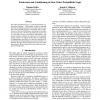Free Online Productivity Tools
i2Speak
i2Symbol
i2OCR
iTex2Img
iWeb2Print
iWeb2Shot
i2Type
iPdf2Split
iPdf2Merge
i2Bopomofo
i2Arabic
i2Style
i2Image
i2PDF
iLatex2Rtf
Sci2ools
AAAI
1996
1996
Irrelevance and Conditioning in First-Order Probabilistic Logic
First-order probabilistic logic is a powerful knowledge representation language. Unfortunately, deductive reasoning based on the standard semantics for this logic does not support certain desirable patterns of reasoning, such as indifference to irrelevant information or substitution of constants into universal rules. We show that both these patterns rely on a first-order version of probabilistic independence, and provide semantic conditions to capture them. The resulting insight enables us to understand the effect of conditioning on independence, and allows us to describe a procedure for determining when independencies are preserved under conditioning. We apply this procedure in the context of a sound and powerful inference algorithm for reasoning from statistical knowledge bases.
AAAI 1996 | Certain Desirable Patterns | First-order Probabilistic Logic | Intelligent Agents | Powerful Knowledge Representation |
| Added | 02 Nov 2010 |
| Updated | 02 Nov 2010 |
| Type | Conference |
| Year | 1996 |
| Where | AAAI |
| Authors | Daphne Koller, Joseph Y. Halpern |
Comments (0)

